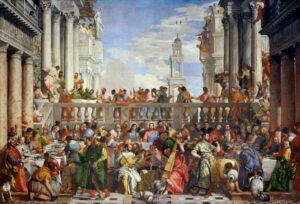Fr Neil’s homily for the Second Sunday after Epiphany, 16 January 2022
To each is given the manifestation of the Spirit for the common good.¹
The last few Sundays and those to follow carry a theme of epiphany — a revealing of who Christ is. The Nativity shows Christ to be the long-expected new-born Davidic king; his Baptism that he is both Son of God and the anointed Messiah. Today at the wedding in Cana, Christ is revealed as the spouse of the people of God in the eternal kingdom.
It is not insignificant that Scripture opens with the union in marriage of Adam and Eve in the garden and ends with the language of the marriage supper of the Lamb in the new kingdom in the book of Revelation.
Marriage as a means of speaking about the relationship with God and his people is profound and revealing. It speaks of a covenant relationship. Promises are exchanged and received. This language about God is revolutionary. People may have been use to the image of the Almighty rightly imposing a set of demands that they were to follow if they wished for his blessing and to remain his people. The wedding imagery, however, speaks of intimate self-giving, an act of loving faithfulness that God embarks upon in relationship to his people.
It is why, in Isaiah, we hear the promised blessing using language that says, “your land shall no more be called Desolate (‘barren’); but you shall be called My delight is in her, and your land married (‘fruitful’).”² They were not to be a people without a God but to be in a relationship with a God who holds them as close to his heart, with a commitment as great as a husband to a wife.
The use of such profound intimacy stresses another implication. Marriage is the established context within which life is born, nourished and flourishes. We are back to our baptisms where we are reborn into the family of God, and the Church is seen as the mother who brings us into this our new family.
If we are sons and daughters of God it is because by our baptism, we are betrothed to Christ, as a member of the Church, his bride. By covenant we are married into the family of God.
The wedding at Cana is so much more than a story of an awkward social situation. A situation to which Christ comes to the rescue by providing enough booze for the party to carry on — after all we have to remember that this isn’t 10 Downing Street!
There is a powerful meditation alone on the final words of our Blessed Lady: “Do what ever he tells you.”³ However the significance of the water turned into wine reveals that this new wine, that Jesus pours out at today’s feast, is the gift of the Holy Spirit given to His bride and body, the Church.
It is this very same gift that Paul is speaking about in today’s Epistle. The bride of Christ is enriched with many blessings of both the fruits and gifts of this new life in the Spirit. They are given to animate our life in him and to provide a spiritual environment in which all members of the family are able to flourish.
Paul is speaking to a divided community in Corinth who are rather smug about the manifestation of the spiritual gifts they have received. Rather than building up people they use them to differentiate between people, to victimise certain groups, and feed their own ego and pride. There is nothing new under the sun.
Paul is adamant that the gifts of Christ, given to his bride, the Church, are meant for the common good and building up of the community of faith, our brothers and sisters in Christ.
Our relationship with Christ is intensely personal as heart speaks to heart⁴. We experience within our very souls Christ’s saving love. His call to follow him as a disciple can only be answered by a personal decision. However, that faith cannot be fully lived out separated from the community of faith. Together we make up the body of Christ; together we walk, support and encourage one another on the road of faith; and together we enable the Church here in this place to be a manifestation of the bride of Christ in whom life is found.
Therefore the gifts that we receive from God are given that we might enable one another to be Church together. It is very easy to come and see what is wrong with the church, the community, indeed the priest and grumble about what it isn’t providing. Some of these insights might well be justified and need to be heard. However, there is the danger of seeing the church merely as a service provider and forgetting that it is a community of faith that stands or falls on the active commitment and genuine faith of its members.
Maybe we can begin by asking, “What gifts have I been given that I can use in this, my community, my church, my spiritual family for the nurture of the common good?”
Christ, as groom, gave everything for the sake of you and me, members of his bride, the Church. What is my appropriate loving response in return?
¹ 1 Corinthians 12:7
² Isaiah 62:4b
³ John 2:5
⁴ St Francis de Sales, letter to the Archbishop of Bourges, 5 October 1604, in Oeuvres de Saint François de Sales (1834); the motto of St John Henry Cardinal Newman








 Posts
Posts